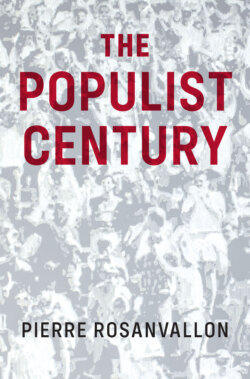Читать книгу The Populist Century - Pierre Rosanvallon - Страница 21
Immediate expression by the people
ОглавлениеFinally, an implicit vision of the self-evidence of the general will is embedded in the populist perspective, once victory over the enemies of the people has been won. This is in keeping with the political philosophy of Carl Schmitt,10 for whom the celebration of popular acclamation as the perfected form of democracy went hand in hand with a critique of the illusions associated with the pluralism of the liberal parliamentary approach. For Schmitt, the people that was constituted in the fight against its enemies was necessarily homogeneous and unanimous. Without borrowing his ethnic conception of homogeneity, his “populist readers” – Chantal Mouffe and Ernesto Laclau among them – have retained his idea of unanimity as the regulatory horizon of democratic expression, with all that this implies in terms of rejecting theories of argumentation and deliberation.11 In this framework, political participation does not define an active citizenry based on the formulation of personal opinions and confrontation between opposing viewpoints; it refers rather to the phenomenon of proving oneself as a member of a community.12 It is a form of Rousseauism grafted onto an a priori assumption of the virtues and potentialities of popular spontaneity, of the good sense of the masses. “All individuals are subject to error and seduction, but not the people, which possesses to an eminent degree . . . consciousness of its own good and the measure of its independence. Because of this its judgment is pure, its will is strong, and none can corrupt or even threaten it.”13 This vision would seem to have been borrowed directly from the passages in Rousseau’s Social Contract deeming that the general will could not err.
An immediate democracy of this sort thus does not require the structuring of political organizations that operate on the basis of an internal democracy; it calls rather for acts of adherence to already-constituted political propositions. An internal democracy would in fact imply the existence of tendencies, debates over strategy, competition among individuals: this is how parties are typically structured. Conversely, a political movement in the image of “the people as one body,” of which it seeks to be both the midwife and the revealer, can only form a coherent and cemented ensemble. This is why populist movements are in phase with the new world of social networks in which a category of followers has arisen; the term characterizes a type of bond among individuals and implies a pole from which initiatives emanate.
The critique of the media that is at the heart of populist rhetoric must be understood and measured by the yardstick of this principle of immediacy. The insults of a Trump addressed to journalists, the vituperations of an Orbán against the henchmen of George Soros, or the calls of a Mélenchon to a “legitimate and healthy hatred of the media” do not stem from simple fits of pique. While they may well translate exasperation and rancor in the face of contrary forces, they share more deeply in a theory of immediate democracy that deems it structurally illegitimate for intermediary bodies – of which the press constitutes a major instance – to presume to play an active role in animating public life and in constituting public opinion. For them, the media are impediments to the expression of the general will rather than necessary contributors to its formation. Viewed through a prism presupposing democratic spontaneity, the media can be regarded as functionally illegitimate and morally illegitimate as well, given their presumed dependency on private interests and the power of money.
